A Brief Biography of Joyce Carol Oates
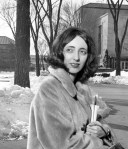 Joyce Carol Oates has often expressed an intense nostalgia for the time and place of her childhood, and her working-class upbringing is lovingly recalled in much of her fiction. Yet she has also admitted that the rural, rough-and-tumble surroundings of her early years involved “a daily scramble for existence.” Growing up in the countryside outside of Lockport, New York, she attended a one-room schoolhouse in the elementary grades. As a small child, she told stories instinctively by way of drawing and painting before learning how to write. After receiving the gift of a typewriter at age fourteen, she began consciously training herself, “writing novel after novel” throughout high school and college.
Joyce Carol Oates has often expressed an intense nostalgia for the time and place of her childhood, and her working-class upbringing is lovingly recalled in much of her fiction. Yet she has also admitted that the rural, rough-and-tumble surroundings of her early years involved “a daily scramble for existence.” Growing up in the countryside outside of Lockport, New York, she attended a one-room schoolhouse in the elementary grades. As a small child, she told stories instinctively by way of drawing and painting before learning how to write. After receiving the gift of a typewriter at age fourteen, she began consciously training herself, “writing novel after novel” throughout high school and college.
—Greg Johnson
Full Text of “A Brief Biography”
Stories That Define Me
 A drunken peasant in czarist Russia is beating his overburdened, dying horse, a mare, and the child Raskolnikov and his father happen upon the scene. Raskolnikov wants to save the horse, but his father pulls him away, saying, as fathers have so frequently—so necessarily—said: It’s none of our business.
A drunken peasant in czarist Russia is beating his overburdened, dying horse, a mare, and the child Raskolnikov and his father happen upon the scene. Raskolnikov wants to save the horse, but his father pulls him away, saying, as fathers have so frequently—so necessarily—said: It’s none of our business.
When I first read “Crime and Punishment” some time in my late teens, and came upon this image, it struck me as neither melodramatic nor lurid; nor was it, in its subtle configuration (child-witness, helpless “civilized” father, brutal “natural” peasant, female horse), anything other than a paradigmatic image, for me, of how the larger world—the world outside the home, the schoolroom, the library—is constituted. A melancholy vision, a “tragic” vision, but inevitable. Uplifting endings and resolutely cheery world views are appropriate to television commercials but insulting elsewhere. It is not only wicked to pretend otherwise, it is futile. If all a serious writer can hope to do is bear witness to such suffering, and to the experience of those lacking the means or the ability to express themselves, then he or she must bear witness, and not apologize for failing to entertain, or for “making nothing happen”—in Auden’s derisory phrase.
—Joyce Carol Oates
Full Text of “Stories That Define Me”
Invisible Writer: A Biography of Joyce Carol Oates
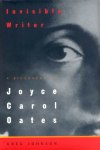 Like Henry James, Oates had long insisted that the true expression of her personality lay not in the random, anecdotal contours of her personal experiences but in the deep counterminings of her art. Along with personal documents and interviews, therefore, the massive collection of her manuscripts in the Joyce Carol Oates Archive seemed crucial to understanding the complex relationship between her experience and her writing. My careful study of her manuscripts revealed, in fact, that many of the accepted notions about her work, and her work habits, were mere fabrications by critics and so-called literary journalists who had, for more than three decades, tirelessly speculated, complained, and gossiped about the phenomenon of “Oates.” When I first visited the archive, my overwhelming impression was of the sheer amount of labor represented by the manuscripts, for they betrayed the stereotype of Joyce Carol Oates as an author who wrote rapidly or carelessly—or easily. The novel manuscripts in particular were astonishing in their complexity, their evidence of ceaseless revision and, of course, their sheer volume.
Like Henry James, Oates had long insisted that the true expression of her personality lay not in the random, anecdotal contours of her personal experiences but in the deep counterminings of her art. Along with personal documents and interviews, therefore, the massive collection of her manuscripts in the Joyce Carol Oates Archive seemed crucial to understanding the complex relationship between her experience and her writing. My careful study of her manuscripts revealed, in fact, that many of the accepted notions about her work, and her work habits, were mere fabrications by critics and so-called literary journalists who had, for more than three decades, tirelessly speculated, complained, and gossiped about the phenomenon of “Oates.” When I first visited the archive, my overwhelming impression was of the sheer amount of labor represented by the manuscripts, for they betrayed the stereotype of Joyce Carol Oates as an author who wrote rapidly or carelessly—or easily. The novel manuscripts in particular were astonishing in their complexity, their evidence of ceaseless revision and, of course, their sheer volume.
—Greg Johnson
The Journal of Joyce Carol Oates: 1973–1982
 …Shaken, but I think instructively, by some “happenstance” of yesterday…in regard to [The] Crosswicks [Horror]…and my sickened reluctance, or dread, or fatigue, or revulsion, or whatever, about beginning the chapter dealing at last with Mandy and the Count. The novel is like Bellefleur, though perhaps worse, in that it seems to involve for me a continuous sifting through the earth, a continuous upturning of relics…images…shards of half-forgotten dreams and memories…. One might express surprise, that the final version of this intense and very disturbing activity is something so distant, so arch, so “chill,” as “The Sole Living Heir of Nothingness”—or, indeed Crosswicks itself, which is first and finally a kind of parody of a defunct literary genre. But he point is that I couldn’t approach this material, explosive to me, in any other way. To go directly and forthrightly and “realistically” to the subject…. I would be devastated; paralyzed; I couldn’t even consider it…. My identification, my helpless sympathy, but my anger too…continued perplexity: why, why? The incubus who is Death; but also a figure of immense attraction. Why does one of us succumb, and another not….
…Shaken, but I think instructively, by some “happenstance” of yesterday…in regard to [The] Crosswicks [Horror]…and my sickened reluctance, or dread, or fatigue, or revulsion, or whatever, about beginning the chapter dealing at last with Mandy and the Count. The novel is like Bellefleur, though perhaps worse, in that it seems to involve for me a continuous sifting through the earth, a continuous upturning of relics…images…shards of half-forgotten dreams and memories…. One might express surprise, that the final version of this intense and very disturbing activity is something so distant, so arch, so “chill,” as “The Sole Living Heir of Nothingness”—or, indeed Crosswicks itself, which is first and finally a kind of parody of a defunct literary genre. But he point is that I couldn’t approach this material, explosive to me, in any other way. To go directly and forthrightly and “realistically” to the subject…. I would be devastated; paralyzed; I couldn’t even consider it…. My identification, my helpless sympathy, but my anger too…continued perplexity: why, why? The incubus who is Death; but also a figure of immense attraction. Why does one of us succumb, and another not….
…Riddles, riddles to break one’s head over, or one’s heart….
—Joyce Carol Oates
The Lost Landscape: A Writer’s Coming of Age
 How many times as a naive first-term graduate student, trailing remnants of literary-mystical idealism, I was made to feel, in the entombed confines of venerable Bascomb Hall, like the humiliated boy-narrator at the conclusion of James Joyce’s “Araby”—a “creature driven and derided by vanity.” I saw myself, too, as the older sister of a child born autistic and doomed never to utter a single coherent sentence through her life, as a creature of sheer chance, the consequence of a “normal” birth; the biochemicals of my brain, unlike those of my unlucky sister Lynn, in a benign equilibrium. I could not claim autonomy, or free will, as I could not claim credit for creating myself, yet I was obliged to play at autonomy, to assume free will, for what alternative is there? As William James said, My first act of freedom will be to believe in freedom. Yet to be proud of one’s intelligence, talent, looks, or achievement has always seemed to me to betray a misunderstanding of the whimsical shake of the dice that grants us, or fails to grant us, our humanity.
How many times as a naive first-term graduate student, trailing remnants of literary-mystical idealism, I was made to feel, in the entombed confines of venerable Bascomb Hall, like the humiliated boy-narrator at the conclusion of James Joyce’s “Araby”—a “creature driven and derided by vanity.” I saw myself, too, as the older sister of a child born autistic and doomed never to utter a single coherent sentence through her life, as a creature of sheer chance, the consequence of a “normal” birth; the biochemicals of my brain, unlike those of my unlucky sister Lynn, in a benign equilibrium. I could not claim autonomy, or free will, as I could not claim credit for creating myself, yet I was obliged to play at autonomy, to assume free will, for what alternative is there? As William James said, My first act of freedom will be to believe in freedom. Yet to be proud of one’s intelligence, talent, looks, or achievement has always seemed to me to betray a misunderstanding of the whimsical shake of the dice that grants us, or fails to grant us, our humanity.
A Widow’s Story: A Memoir
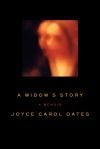 This “Oates”—this quasi-public self—is scarcely visible to me, as a mirror-reflection, seen up close, is scarcely visible to the viewer. “Oates” is an island, an oasis, to which on this agitated morning I can row, as in an uncertain little skiff, with an unwieldy paddle—the way is arduous not because the water is deep but because the water is shallow and weedy and the bottom of the skiff is endangered by rocks beneath. And yet—once I have rowed to this island, this oasis, this core of calm amid the chaos of my life—once I arrive at the university, check my mail, and ascend to the second floor of 185 Nassau where I’ve had an office since fall 1978—once I am “Joyce Carol Oates” in the eyes of my colleagues and my students—a shivery sort of elation enters my veins. I feel not just confidence but certainty—that I am in the right place, and this is the right time. The anxiety, the despair, the anger I’ve been feeling—that has so transformed my life—immediately fades, as shadows on a wall are dispelled in sunshine.
This “Oates”—this quasi-public self—is scarcely visible to me, as a mirror-reflection, seen up close, is scarcely visible to the viewer. “Oates” is an island, an oasis, to which on this agitated morning I can row, as in an uncertain little skiff, with an unwieldy paddle—the way is arduous not because the water is deep but because the water is shallow and weedy and the bottom of the skiff is endangered by rocks beneath. And yet—once I have rowed to this island, this oasis, this core of calm amid the chaos of my life—once I arrive at the university, check my mail, and ascend to the second floor of 185 Nassau where I’ve had an office since fall 1978—once I am “Joyce Carol Oates” in the eyes of my colleagues and my students—a shivery sort of elation enters my veins. I feel not just confidence but certainty—that I am in the right place, and this is the right time. The anxiety, the despair, the anger I’ve been feeling—that has so transformed my life—immediately fades, as shadows on a wall are dispelled in sunshine.
Raymond J. Smith
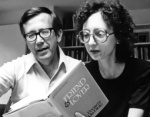 I see editing a magazine not as compiling but creating, and the finished product as a work of art in its own right …. the editor, for better or worse, contributes (no matter how little) to the shaping of a culture. He need not, and perhaps should not, be doctrinaire; nevertheless, he will have values—aesthetic, cultural, even moral, that will be reflected in what he chooses to publish.
I see editing a magazine not as compiling but creating, and the finished product as a work of art in its own right …. the editor, for better or worse, contributes (no matter how little) to the shaping of a culture. He need not, and perhaps should not, be doctrinaire; nevertheless, he will have values—aesthetic, cultural, even moral, that will be reflected in what he chooses to publish.
—Raymond J. Smith
Selected Texts about Raymond J. Smith
My Father, My Fiction
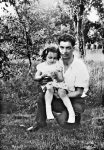
One of my most deeply imprinted memories of childhood is of being taken up in a small plane by my father: tightly buckled in the front seat of a two-seater Piper Cub as my father in the cockpit behind me taxis us along the bumpy runway of a small country airport outside Lockport. Suddenly, the rattling plane leaves the ground, lifts above a line of trees at the end of the runway, climbing, banking, miraculously riding the air currents until the roaring noise of the engine seems to subside and we’re airborne, and below is a familiar landscape made increasingly exotic as we climb. Transit Road and its traffic … farmland, wooded land, hedgerows … houses, barns, pastureland, intersecting roads … creeks and streams … and the sky opening above us oceanic, unfathomable.
—Joyce Carol Oates
Full Text of “My Father, My Fiction”
A Letter to My Mother, Carolina Oates, on Her 78th Birthday
 The old farmhouse was razed years ago, the very site of its foundation filled with earth, all trace of its existence obliterated. Yet I see it clearly, and the lilac tree that grew close beside the back door, a child-size tree into which I climbed, a dreamy child given to solitude in places near the house, near you. Within the sound of your raised voice. Joyce! Joy-ce! Why is it always a misty-hazy summer day, that peculiar translucence to the light that means the air is heavy with moisture though the sky is cloudless, the sun prominent overhead? The house of my childhood is the house of recurring dreams yet subtly altered, the rooms mysterious, their dimensions uncertain—always there is a promise, alarming yet tantalizing, of rooms yet undiscovered, rooms beckoning, yet to be explored. Your presence permeates the house—you are the house, its infinite rooms. I see you pushing me on the swing, your hair reddish brown, you’re wearing a shirt and pale blue pedal pushers—I’m a lanky child of 9 or 10 on the swing Daddy made for me, the swing I loved, hemp rope hanging from a metal pipe secured between the branches of two tall trees in the backyard.
The old farmhouse was razed years ago, the very site of its foundation filled with earth, all trace of its existence obliterated. Yet I see it clearly, and the lilac tree that grew close beside the back door, a child-size tree into which I climbed, a dreamy child given to solitude in places near the house, near you. Within the sound of your raised voice. Joyce! Joy-ce! Why is it always a misty-hazy summer day, that peculiar translucence to the light that means the air is heavy with moisture though the sky is cloudless, the sun prominent overhead? The house of my childhood is the house of recurring dreams yet subtly altered, the rooms mysterious, their dimensions uncertain—always there is a promise, alarming yet tantalizing, of rooms yet undiscovered, rooms beckoning, yet to be explored. Your presence permeates the house—you are the house, its infinite rooms. I see you pushing me on the swing, your hair reddish brown, you’re wearing a shirt and pale blue pedal pushers—I’m a lanky child of 9 or 10 on the swing Daddy made for me, the swing I loved, hemp rope hanging from a metal pipe secured between the branches of two tall trees in the backyard.
—Joyce Carol Oates
Full Text of “A Letter to My Mother”
The Wedding Celebration of Joyce Carol Oates and Charlie Gross
 And because he and Joyce chose to elope as they did, and forsook the cautionary formalities of a long courtship, or an engagement, or dating, (or, some local skeptics would say, even forsook the formality of an actual acquaintanceship), the groom has therefore forsaken the chance to think long about his prospective act, as well as the chance to complain about anything, or to be granted a reprieve, or even a hearing. You, Charlie, must realize, now — a little late, you might believe — that he who marries a novelist must expect to see himself in print long before he sees himself in clover. The groom has been blessed with long life, it’s true. But art is much, much longer.
And because he and Joyce chose to elope as they did, and forsook the cautionary formalities of a long courtship, or an engagement, or dating, (or, some local skeptics would say, even forsook the formality of an actual acquaintanceship), the groom has therefore forsaken the chance to think long about his prospective act, as well as the chance to complain about anything, or to be granted a reprieve, or even a hearing. You, Charlie, must realize, now — a little late, you might believe — that he who marries a novelist must expect to see himself in print long before he sees himself in clover. The groom has been blessed with long life, it’s true. But art is much, much longer.
—Richard Ford
Full Text of The Wedding Celebration

dear oates,
We have read your memoir “The story of a widow”, written by you, about 40 people who came together in three different provinces of Turkey.
you have written a very impressive and beautiful work. We commemorate dear Ray with love. This is a really great text and from what you wrote there we learned a lot about life, human relationships and loneliness.
In three weeks from May 22, we will talk about this novel at three separate meetings. I wanted to inform you about this.
Also, could there be some special things that you would like to tell us that are not included in this work?
best regards
LikeLike
JC Oates book Wonderland is number 5 on Joan Didion’s list of books that changed her life! oh I love them both! I was so happy about that..
LikeLike